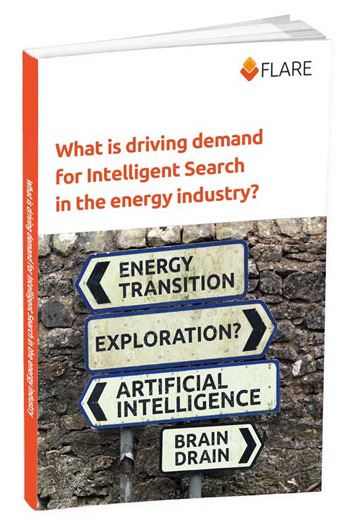What is driving demand for Intelligent Search in the energy industry?
This paper explores why Intelligent Search has become such an in-demand technology within the energy sector and what steps you can take to transition to intelligent information management within your organisation.
What is Intelligent Search?
Energy companies that extract the most value from their data and information will benefit the most from their investment, but extracting that value can be challenging, especially as information is often difficult to find, retrieve and use.
Intelligent Search represents an innovative and effective solution to extracting value from a wide variety of information sources so that more people can access the right information at the right time.
The general idea is that users can quickly access multiple information sources, from one or more touchpoints, irrespective of whether the information is stored internally or externally to the organisation.
Central to Intelligent Search is the creation of an industry-specific taxonomy that delivers a classification system to make sense of your entire information landscape.
In addition, the human interface (e.g. where you type your search term) is increasingly powered by artificial intelligence capabilities to make it easier for the system to understand the intent of the user’s search term and deliver on their retrieval requirements.

What is driving the demand for Intelligent Search within the energy sector?
Government focus on UK energy transition

Energy companies that extract the most value from their data and information will benefit the most from their investment, but extracting that value can be challenging, especially as information is often difficult to find, retrieve and use.
Intelligent Search represents an innovative and effective solution to extracting value from a wide variety of information sources so that more people can access the right information at the right time.
The general idea is that users can quickly access multiple information sources, from one or more touchpoints, irrespective of whether the information is stored internally or externally to the organisation.
Central to Intelligent Search is the creation of an industry-specific taxonomy that delivers a classification system to make sense of your entire information landscape.
In addition, the human interface (e.g. where you type your search term) is increasingly powered by artificial intelligence capabilities to make it easier for the system to understand the intent of the user’s search term and deliver on their retrieval requirements.
Moving away from exploration
There has always been a focus on exploration for the typical carbon-centric energy company, which is reflected in the underlying taxonomies and features of energy search solutions.
A taxonomy is a means of classifying information within an organisation using a system that allows definitions, meanings and relationships to be easily stored, updated and applied to information objects.
As the industry transitions, it will require extensions to taxonomies that can describe the information and data of the new operations.
However, even though your organisation may shift its operating model away from fossil fuels and exploration search requirements, you will still need to maintain legacy taxonomies and data structures to manage your current commitments, and later, to support regulatory audits and decommissioning strategies.
But there is unquestionably a shift away from oil and gas exploration within the energy sector, driving the need for a more holistic and capable search solution.

The energy sector ‘Brain Drain’

There has been a steady decline in search and information management expertise within most energy organisations, which is not likely to change soon.
As search specialists, we’ve operated within the energy sector for three decades, and it’s fair to say today’s information management team structure and knowledge pool is markedly different from earlier years.
With the advent of outsourced IT services, many energy firms lost experienced staff with information expertise.
In addition, search technology had historically dropped down the CIO/CTO agenda, so information management as an internal capability has lagged behind other disciplines.
This lack of expertise means some energy organisations are faced with legacy capabilities that just can’t adapt and deliver what the business needs now and in the future.
Hence the need for more Intelligent Search solutions that can still serve legacy needs but with the flexibility and adaptability to cope with different search behaviour across a more diverse information landscape.
The promise of artificial intelligence and machine learning
There is considerable chatter within the energy sector about the rise of AI/ML and how it will radically transform modern search capability.
As a result, we’ve indeed witnessed an uptick in conversations with energy organisations looking to apply AI/ML to improve search usability and performance.
A sense of caveat emptor should prevail with any innovation, and AI/ML is no different. We believe that AI/ML can augment a carefully crafted search solution, but a high degree of pragmatism around the capabilities of AI/ML needs to be adopted.
The push for Digital Transformation
It feels like most of the energy organisations we consult for or have chatted with lately are actively planning or implementing some form of Digital Transformation.
Digital Transformation is about embracing rapidly evolving technological innovation to improve your business model.
It’s this shift, sometimes subtle, other times seismic, that creates a knock-on impact with your search and storage architecture. New sources of information (and new search requirements) invariably drive a demand for more Intelligent Search solutions.

What are some of the most common search challenges cited by energy organisations?

Failure to demonstrate the ROI and value of Intelligent Search and taxonomy implementation to internal sponsors
Let’s talk about the elephant in the room – improving search isn’t the most attractive innovation to sell internally.
Senior leaders are unlikely to be overcome with heady excitement at an invitation to a briefing on the merits of effective taxonomy design.
Many will openly ask:
“How is this any better than other search solutions, including our current legacy approach? Won’t it cost a fortune but for little return?”
Selling Intelligent Search requires you to align the strategic aspirations of the business to the unique capabilities and outcomes that Intelligent Search presents. This type of alignment requires deep, Intelligent Search expertise of its architecture and technical abilities, in addition to its impact on commercial, operational, and regulatory use cases.
It helps to share relevant use cases from across the energy industry to help you make the case and demonstrate the sea change within the sector.
You also need to understand the urgency and efficiency gains associated with Intelligent Search so that your business case is compelling and relevant.
Struggling to find the correct information
We’re often asked to review an existing search implementation, and it’s clear that many users are struggling to find the information they need.
There can be many reasons for this:
- Users are unclear which information repositories or systems to search
- Poorly designed search interface with multiple systems often confuse users
- Lack of tuning and refinement to the distinct language and terminology within the energy industry
- Incomplete and inaccurate search results due to a lack of knowledge about the relationships between different information items, terms and concepts
- Too many results (many with limited relevance to the intended search)
- Overall lack of trust in the search results returned
The cost of search is too great
We introduced the ‘lack of budget’ issue above, but sometimes the total cost of ownership with a legacy search solution is too great.
Part of the challenge is that most energy organisations operate a siloed IT and search architecture, resulting in disparate systems that are difficult to integrate into a cost-effective Intelligent Search capability.

What outcomes do energy organisations seek from a more Intelligent Search capability?

At Flare, we regularly canvas organisations in the energy sector to understand their goals for Intelligent Search. These are some of the typical responses we hear:
“We want to maximise the value of our available information by improving search results, accuracy, ranking and integration”.
Energy companies tell us that one of their biggest challenges is the volume and complexity of their information sources. Users want information that is not only accurate and relevant but adequately ranked and filtered, no matter where that information resides.
“We want to iteratively improve standards by stealth, helping us to improve AI and ML efforts”.
We often hear that organisations don’t want to face months of upheavals and significant technical hurdles. They want to see the change to search implemented in a low-impact, gradual manner, with emerging technologies like AI and ML phased into the organisation so that users have time to learn and adapt their behaviour.
“We want to enhance all of our interactions with information, making it easy to identify, store, analyse and retrieve content”.
Creating an Intelligent Search solution requires a more robust supporting architecture (such as a taxonomy) which allows for a much broader set of capabilities than the standard search tools provided by platforms such as SharePoint.
With the correct architecture, you can extend your information management capabilities to transform your value proposition in many exciting directions.
“We want to reduce the time spent looking for trusted information”
Energy staff want the correct information, but they also want it in a timely fashion. Many roles rely on time-critical access to information, so they can’t spend hours, or even days, trawling endless information sources.
The appeal of Intelligent Search is that it is a system that interprets your search intent more effectively, combined with a high-speed retrieval system to give energy staff the desired outcome – the right information at the right time.
“We want to simplify the integration and administrative ‘bloat’ of our current search architecture to reduce our TCO”
Technology leaders tell us they’re tired and frustrated at paying too much for their existing information management and search solutions.
Many energy organisations have grown through acquisition and have inherited a somewhat ‘bloated’ search infrastructure, with multiple point solutions and plenty of duplicated functionality.
All of this adds up to an inflated cost of ownership coupled with an unnecessary administrative burden.


All of this adds up to an inflated cost of ownership coupled with an unnecessary administrative burden.
How can you launch Intelligent Search within your organisation?
Now we’ve identified some clear drivers, let’s explore how your organisation can make the transition to an Intelligent Search solution.
The following diagram outlines the major structural components required to deliver an Intelligent Search capability:
Here’s what a typical roadmap looks like when we work with organisations to roll out a transition to a next-generation Intelligent Search capability:
Step A: Capture and translate your existing company knowledge (e.g. in your taxonomy and knowledge bases) into a unified taxonomy
At Flare, we’ve spent over two decades developing a comprehensive taxonomy for the energy industry to help accelerate the knowledge gathering process.
Step B: Augment your revised taxonomy with additional industry knowledge and standards
Because our taxonomy is enriched with the broader energy sector (e.g. renewables) and expanding daily, our approach allows you to grow your existing taxonomy in whichever direction your business model takes.
Step C: Select prioritised stranded silos
Next, we would recommend identifying silos of high-value information that have previously been stranded or proved to be problematic in some way. You can then incorporate these assets into your new Intelligent Search apparatus.
Step D: Tag based on priority and current perceived value
During this stage, you’ll be indexing and tagging all the files across your information landscape so that your source information is ready for search and retrieval functions.
Step E: Expose knowledge bases and indexes to all required touchpoints
Your next step is to extend the taxonomies to all human or machine interfaces where search/storage functionality is required.
Some of these could include:
- Manual search interfaces
- Free text searches
- Data mining applications
- Geographical Information Systems
- Automated integration with client and third-party tools/ portals via programmable interfaces
- Intelligent ‘Help’ in customer service apps
Start to build a solid IM foundation to streamline your future information management and digital strategies
Your goal so far has been to improve your search. With a taxonomy and other technologies in place, you now have a solid platform to extend your information management capabilities to support future initiatives such as a digital transformation strategy.
Next Steps
Interested in exploring the benefits of Intelligent Search within your organisation but need some help on how to get started?
Reach out to arrange an initial discussion where we’ll explore your challenges and explain how our next generation Intelligent Search capabilities can help address your commercial and operational needs.


Download A PDF Copy Of This Paper…
This paper explores why Intelligent Search has become such an in-demand technology within the energy sector and what steps you can take to transition to intelligent information management within your organisation.
Simply fill out the form provided to get instant access to your free copy!
